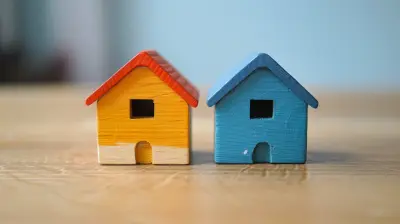Should You Pay Off Your Mortgage Early or Invest the Extra Cash?
29 September 2025
Let’s face it — this is one of those classic personal finance head-scratchers. You’re cruising along, making your monthly mortgage payments like a responsible adult. But then you realize you’ve got some extra cash — maybe a bonus, a raise, or you finally stopped impulse-buying stuff on Amazon (no judgment). And the big question hits you: should you throw that extra money at your mortgage and kiss those monthly payments goodbye sooner? Or should you toss it into the market and let compound interest work its fancy magic?
If you’ve been sitting on the fence, unsure whether to go all-in on your mortgage or ride the investment rollercoaster, don’t worry — you’re not alone. Let's unpack this conundrum together, and we'll keep it real, quirky, and simple.
The Great Financial Tug-of-War: Emotions vs. Math
Before diving into numbers, let’s get one thing straight — money decisions aren’t just about math. They’re about emotions too. Emotionally, the idea of owning your home outright is seductive. Imagine never seeing that “mortgage due” email again. Pure bliss, right?But then math walks in wearing a green visor and says, “Hold up, let’s talk return on investment.”
So, which side do we listen to? Heart or head?
Spoiler alert: the answer might be a mix of both.
The Case for Paying Off Your Mortgage Early
Alright, let’s start with the feel-good option — paying off your mortgage ASAP. Here's why that might make sense:1. 🧘 Peace of Mind
There’s something deeply satisfying about not owing anyone a dime on your home. It's like finally taking off tight jeans after a long day — a relief you didn’t realize you needed. With the mortgage gone, your monthly expenses drop dramatically, giving you a layer of financial freedom.That kind of peace? Can’t always be measured in dollars.
2. 💸 Interest Savings
Let’s say you have a 30-year mortgage at 5%. Over time, you could end up paying almost as much in interest as you did for the house. Every time you make an extra payment, you're sidestepping future interest. It’s like punching compound interest in reverse.So, if your mortgage rate is higher than your expected investment returns, paying it off is a no-brainer financially.
3. 📉 Guaranteed Return
When you pay off your mortgage early, you’re getting a guaranteed “return” equal to your mortgage interest rate. It’s risk-free. There’s no chance of the market tanking like it’s 2008 again. It’s the financial equivalent of betting on a horse race you already know the outcome of.
The Case for Investing Instead
Now let’s flip the coin and look at the other side. What if you chose to invest that extra cash instead of dumping it into your mortgage?1. 🚀 Higher Potential Returns
Historically, the stock market has returned around 7–10% annually (after inflation). Let’s say your mortgage interest rate is 3.5%. If your investments are averaging 8%, you’re effectively earning 4.5% more than what you’d save on the mortgage interest.Math brain says: why settle for small potatoes when you could be harvesting a field of golden french fries instead?
2. 🧮 Liquidity & Flexibility
Money tied up in your house is, well… tied up. If a sudden expense pops up, you can’t exactly slice off a piece of your kitchen and sell it on eBay. On the other hand, investments — especially in a brokerage account — are way more liquid. You can sell some assets if you need funds. (Just watch out for taxes and timing.)Having liquid assets can also provide better flexibility for big life moves — like starting a business, retiring early, or buying a boat named “YOLO.”
3. 💰 Compound Interest Is Your BFF
The earlier you start investing, the harder your money works for you thanks to compound interest (aka the financial equivalent of your money having babies that make more money babies). Even small, consistent investments over time can snowball into a hefty nest egg.Every dollar not sent to your mortgage can go into your investments, potentially earning more and more over the decades.
Pay Off vs. Invest: Let’s Do Some Crunching
Let’s say you’ve got an extra $1,000 per month. You’re wondering — should you throw it at your mortgage or invest it?- Mortgage rate: 4%
- Potential investment return: 8%
- Timeframe: 20 years
If you invest that $1,000 monthly for 20 years at 8%, you’d end up with around $568,000.
But if you use that $1,000 to pay down your mortgage early (let’s say it wipes it out in 15 years instead of 30), you save a ton in interest — maybe somewhere around $100,000–$150,000 depending on your loan terms.
So mathematically, investing seems like a better deal. But that assumes the market cooperates (lol, sometimes it doesn’t).
When It Makes Sense to Pay Off Early
So when is paying off your mortgage early actually the smarter move?✅ You Have a High-Interest Mortgage
If your mortgage rate is above 5-6%, it might be hard for your investments to “beat” that in a risk-adjusted way. In that case, paying it off offers a better and safer return.✅ You’re Close to Retirement
If retirement is knocking on your door (or at least texting you), being mortgage-free can make a huge difference. Your monthly expenses go down, giving your retirement savings more room to breathe.✅ You Can’t Sleep at Night
If the thought of owing the bank keeps you up, even if the math says otherwise, go ahead and pay it down. Money is about security AND peace of mind.When It Makes Sense to Invest Instead
And when should you NOT rush to pay off your mortgage?✅ You Have a Low, Fixed Rate
If your mortgage is sitting pretty at 3% or less, congrats — that’s basically free money. Don’t rush to pay it off when that cash could be making more elsewhere.✅ You’re Behind on Retirement Savings
Retirement money is like sourdough starter — the earlier you feed it, the better it grows. If you’re lagging behind on your retirement goals, investing needs to take the driver’s seat.✅ You Want More Liquidity
Got big life plans or just the desire for a financial safety net? Then having your money tied up in a paid-off home might not offer the flexibility you need.The Hybrid Approach: Best of Both Worlds?
Guess what? This doesn’t have to be an all-or-nothing situation.You can absolutely pay a little extra on your mortgage each month AND invest the rest. It’s like having your avocado toast and your latte too.
That way, you:
- Save on interest
- Build equity
- Grow your investments
- Sleep soundly at night knowing you're not putting all your eggs in one financial basket
A balanced approach can also give you the emotional satisfaction of making progress on your mortgage, while still letting compound interest work its charm.
Other Factors to Consider
This decision isn’t just about numbers either. Let’s throw a few more ingredients into the mix:📊 Taxes
Mortgage interest is sometimes tax-deductible (depending on your situation), so paying it off early could reduce your deductions. On the flip side, investments can come with capital gains taxes. Always consult your tax pro before making big moves.🚨 Emergency Fund
Before you do either, make sure you have 3–6 months’ worth of expenses in a liquid emergency fund. Trust me — no one wants to be “house-rich and cash-poor” when life throws a curveball.🏘️ Real Estate Market
If you’re planning to sell your home soon, throwing extra money at your mortgage might not make sense. That equity could be better off growing in investments that aren’t tied to your property value.The Final Verdict? It Depends (But You Knew That…)
Personal finance is personal. What makes sense for your neighbor might not work for you.If you love the idea of being debt-free, value peace of mind, or have a high-interest mortgage — go ahead and pay it off early.
If you’ve got a low rate, want to grow your wealth aggressively, or need more liquidity — investing may be the better route.
And if you’re still not sure? Go hybrid. Pay a little extra on your mortgage and invest the rest. That way, you win both ways.
Money decisions don’t have to be black and white. Sometimes the best path is your own funky, colorful middle road.
TL;DR (Too Long; Didn't Read)
- Paying off your mortgage early gives peace of mind and guaranteed interest savings.- Investing can offer higher returns — but comes with risk.
- The decision depends on your goals, risk tolerance, mortgage rate, and retirement plans.
- You can always do both — it’s not a mutually exclusive choice.
- Choose what helps you sleep at night while still growing your wealth during the day.
Remember, your money should work for YOU, not the other way around.
all images in this post were generated using AI tools
Category:
Mortgage TipsAuthor:

Yasmin McGee
Discussion
rate this article
1 comments
Briar McDougal
Unlock hidden truths: debt or wealth? Choose wisely.
October 12, 2025 at 3:26 AM

Yasmin McGee
Choose based on your financial goals: paying off debt offers security, while investing can build wealth. Evaluate your priorities!


